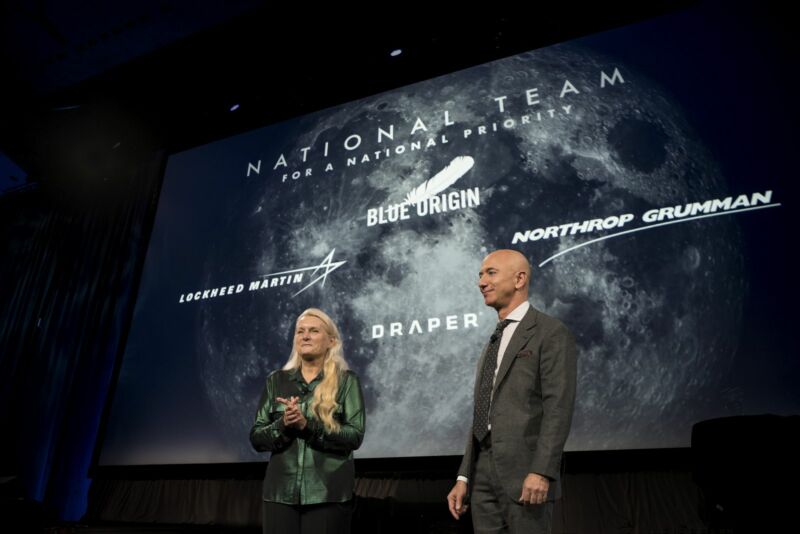This is probably why Blue Origin keeps protesting NASA’s lunar lander award

On Wednesday, the US Government Accountability Office released its full-but-redacted decision that ruled in favor of NASA’s selection of a Human Landing System contractor. The document (see PDF) makes clear that SpaceX offered NASA the most technically ready, well-managed, lowest-cost option.
Furthermore, the decision document says NASA was entirely justified in selecting a single winner for the lunar lander bid because Congress appropriated only about one-quarter of the funds sought by the space agency. NASA, the document states, “expressly put all offerors on notice that the number of awards was subject to available funding, and the agency could make multiple contract awards, a single award, or no award at all.”
As it has already done several times since NASA’s original decision to select SpaceX in April, Blue Origin greeted the GAO’s full decision with a testy response. “We stand by our assessment that SpaceX received preferential treatment,” the statement says, in part.
Blue Origin is clearly not giving up on the Human Landing System contract, nor is it shy to continue attacking NASA and its choice of SpaceX to build the lander, even if it now seems like a forlorn hope. NASA made its decision in April. And now the GAO looked into the matter and found that NASA’s decision was sound and justified.
So what the heck is Blue Origin and its founder, Jeff Bezos, up to? Why is his company continuing to look like a sore loser in the industry and continuing to insult an important customer in NASA? I have a theory.
Back in 2004, a company named Kistler Aerospace won a $227 million contract from NASA to complete the development of its K-1 rocket and allow for the delivery of supplies to the International Space Station. The agency justified the contract on the basis that no other US company had a launch vehicle near completion. At the time, Kistler claimed that about 75 percent of the K-1 rocket’s design was complete. The company had invested about $600 million over the previous decade to reach this advanced development stage.
SpaceX CEO Elon Musk greeted this announcement with anger. Although SpaceX was only two years old and would not make its first Falcon 1 launch attempt for another two years, Musk believed that NASA awarded the contract to Kistler due to favoritism. (The company’s CEO was George Mueller, a leader of the Apollo Program and longtime NASA insider). Musk felt that SpaceX should have been allowed to compete for the contract.
“I was told by many people that we should not protest,” Musk recounted to me for the book Liftoff, about SpaceX’s origins. “You’ve got a 90 percent chance that you’re going to lose. You’re going to make a potential customer angry. I’m like, it seems like ‘right’ is on our side here. It seems like this should go out for competition. And if we don’t fight this then I think we’re doomed, or our chances of success are dramatically lowered. NASA being one of the biggest customers of space launch would be cut off from us. I had to protest.”
He did, and ultimately, SpaceX won. After learning that the GAO would rule in favor of SpaceX, NASA pulled the award to Kistler and opened a new process that became known as Commercial Orbital Transportation Services, or COTS. SpaceX won one of these awards in 2006, and it helped the company grow quickly while also providing much-needed funding as SpaceX went through its Falcon 1 teething pains. COTS led to operational contracts to deliver cargo and crew to the space station. These contracts have been essential to SpaceX’s financial success.
Jeff Bezos knows his space history. And he looks at how SpaceX has been able to leverage federal contracts into rapid growth and hardware development programs with envy.
So it seems likely to me that Bezos views the Human Landing System contract as COTS for Blue Origin. If the company could win this award, it would have a glide path toward future NASA contracts and the funding that follows.
The problem for Bezos is that the US aerospace industry is vastly different today than it was in 2004. SpaceX and a host of other new space companies have come along, and NASA is no longer desperate for providers of space services. Moreover, NASA did have a competition for services with the lunar lander. It’s just that there was only money for one provider. The GAO decision reinforces this conclusion.
But perhaps the biggest problem with this being Blue Origin’s COTS moment is this: SpaceX is still SpaceX, still the upstart, and still hustling all these years later.
That means Blue Origin is not the upstart. Rather, it slots more comfortably into the Kistler role—a company that has spent large amounts of money over a decade to build an orbital rocket that remains a few years away from the launch pad.
https://arstechnica.com/?p=1786407